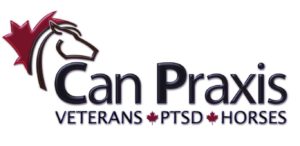
Horses and psychology; at first glance it’s a strange combination. The former, a symbol of speed and power, the latter symbolized with couch-surfing and navel gazing. But no matter the perceived differences, in the hands of Can Praxis the marriage of horses and psychology is proving to be a powerful method of helping soldiers and their loved ones recover from the psychological strain of Operational Stress Injuries (OSI).
Can Praxis
Can Praxis is a partnership between Steve Critchley and Jim Marland, ‘Can’ signifying Canadian and a can-do attitude, ‘Praxis’ being the Latin word for putting theory into practice. Having retired after a 28-year career in the Canadian Forces, Critchley was working as a mediator and negotiator when he was approached by Marland with the idea of using horses to treat soldiers suffering from Post-Traumatic Stress Disorder, or PTSD. A psychologist with a background in Equine Assisted Learning, Marland made a convincing case that appealed to Critchley’s own experience working with horses.
The theory of using horses to treat OSI is grounded in Meaning Centered Counselling. As applied by Can Praxis, this approach believes that establishing strong communication is a necessary pre-condition for people to open up and understand their injuries and suffering, which in turn leads to possible solutions. Conversely, poor communication leads to isolation, which can aggravate an OSI and sometimes lead to a fatal result.
Treatment Protocol
Through this perspective, Can Praxis focuses on giving their clients the tools to communicate, the first step in finding the four corners of the puzzle that is their OSI. With good communication in place, other therapies become more effective in treating the injury, or in filling out the remainder of the puzzle. Can Praxis achieves this goal by aiming to provide an injured person and their spouse or family member the ability to have one effective conversation a day, as well as the life skills to improve from that level.
But how do horses fit in? First, horses are social animals that crave social interaction. Horses also have a built in chain-of-command, a pecking order that is intuitively relatable to military personnel. Lastly, horses evolved as prey animals and are hyper-sensitive to their environment and how people are acting. Because of these features, horses are ideal in providing instant feedback on how a person is communicating; approaching a horse with aggression or attitude directly affects how they respond. Ultimately, a horse responds best when they feel a person is worth knowing and trusting, a strong foundation of good communication.
Can Praxis applies their treatment philosophy through a three part program. Phase 1 lasts three days split between the classroom and the arena, where participants perform walk-along exercises with the horses. Phase 2 occurs four months later, with veterans and family members participating separately. Over three days, participants ride during the day and at night they debrief with Steve and Jim about what has been working. The third phase is again in partners and consists of a three-day trail ride in the wilderness near Rocky Mountain House, with riding by day and debriefs around the camp fire at night.
To date, the Can Praxis program has proven extremely effective at giving participants much needed tools to manage their situations. Steve’s military experience and training as a mediator complements and is in turn complemented by Jim’s knowledge as a psychologist, and together they help participants understand and cope with conflict and crises. This blend of experience and theory is key to getting veterans and their spouses or family members to the same place at the same time, and crucially, involves viewing both participants as equal partners in treatment. Veterans often have no idea of how badly their spouses are themselves suffering and conversely, spouses are often unaware of the limitations of a military worldview, such as a ‘black-or-white’ attitude.
Challenges
Of course, there are challenges. While Can Praxis receives valuable support from its national funding partner, Wounded Warriors Canada, expenses quickly add up, especially since Can Praxis is a national program that covers all costs for participants, including airfare. What’s more, equine assisted therapy is an emerging field for which there is currently no certifying body. Although low barriers to entry might seem desirable since it allows for more treatment providers, it also potentially means varying levels of expertise. Prospective clients should be encouraged to do their research before committing so as to increase their chances of a favorable experience.
The Future
At the same time, these challenges provide opportunities for growth. Following on similar work with service dogs, Veterans Affairs Canada will conduct a study on equine programs in an effort to help Can Praxis become more firmly established. Similarly, Can Praxis is looking to expand, both by training more facilitators and by developing a location to offer the same programs in eastern Canada. Lastly, Can Praxis would also like to provide programs for first responders, another vital constituency that often suffers from OSIs.
In a way, Can Praxis’s program is a natural extension of the bond shared by humans and horses throughout Canada’s history. From first inhabitants, through waves of settlement, to a continued role on farms and in recreation, horses have long worked with humans, helping us travel faster and farther, or carry more than we could have by ourselves. In the process, people and horses have often developed special connections based on communication that goes beyond words. As unconnected as horses and psychology may at first seem, in reality Can Praxis is simply continuing a long tradition of partnering with horses to overcome our limitations and improve our lives, in this case, by helping soldiers and their loved ones recover from OSIs.
The below video gives a good feel for the Can Praxis experience.
https://www.youtube.com/watch?v=rYZ8akRhabA
For those who’d like to know more, please check out www.canpraxis.com, or contact Steve Critchley at steve@canpraxis.com.